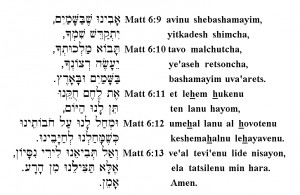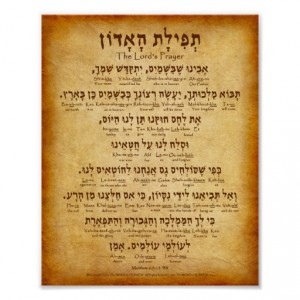Our Father: Jesus and His Jewish Lord’s Prayer
Author: Bobby Valentine | Filed under: Discipleship, Exegesis, Hermeneutics, Jesus, Jewish Backgrounds, Prayer, Spiritual DisciplinesIntroduction
Recently I’ve been taking a small group thru the “revolution” of the Lord’s Prayer. What a prayer it is. In my own practice of the Spiritual disciplines I begin each time with the “Jesus Creed” and end with the “Lord’s Prayer.” I did not always do this, in fact for most of my life I did not pray the Lord’s Prayer.
But Jesus fully intends this to be prayed by his disciples. It is the cry of the kingdom from people on The Way of kingdom. It is a communal prayer (there is no “I” or “me” but only “our” “we” and “us” in this prayer). When we pray, we can never forget that the “Jesus Creed” calls us to love our neighbor, and we do that in the kingdom prayer. We do not come to the throne alone rather we come with our family. Always.
But today I want to focus on something slightly different. I have pointed out how I was raised in Churches of Christ and the Hebrew Bible functioned very rarely as the Word of God (there is a difference between claiming that it is and how it functions). We studied the “Old Testament” only minimally and when we did I do not ever recall examining how that “Old Testament” then functioned in the pages of the “New Testament” itself. The unspoken (and many times spoken) assumption was that whatever Jesus said or the apostles taught was different (frequently radically so) from the pages of the Hebrew Bible and Judaism. This is, I now know, an absurd position that cannot be sustained on any page of the NT. So with that in mind I will say “The Lord’s Prayer” is incredibly Jewish. Many years ago I was talking to a Rabbi friend and pointed out “the Lord’s Prayer is basically the essence of the Hebrew Bible.” Of course I did not know that at the time.
Our Father (Mt 6.9)
“Our Father” has numerous Exodus connections, in the Bible where God rescues his “first born son” (Ex 4.22-23; Hos 11.1; See Father in Isa 63.10-17; Jer 3.16-19). But Israel is not just called “first born son,” but our ancestors were told God was their Father. Moses says “O foolish and unwise people. Is he not your Father, your Creator” (Dt 32.6). Other texts Jesus knew and the early church did as well (and I will quote them because Evangelical Bibles make connecting with the ancient church more difficult)
“O Lord, Father and Master of my life, do not abandon me to their designs … O Lord, Father and God of my life, do not give me haughty eyes, and remove evil desire from me” (Sirach 23.1, 4).
“I cried out, ‘Lord, you are my Father; do not forsake me in the days of trouble, when there is no help against the proud” (Sirach 51.10; cf Wisdom 14.3)
This is a longer quote but it resonates well with the context of the Lord’s Prayer, from Tobit …
“Blessed is God who lives for ever, and blessed is his kingdom . . .
Acknowledge him before the Gentiles, O sons of Israel;
for he has scattered us among them.
Make his greatness known there,
and exalt him in the presence of all the living;
because he is our Lord and God,
he is our Father for ever.
He will afflict us for our iniquities; and again he will show mercy,
and will gather us from all the nations among whom you have been
scattered …
If you turn to him with all your heart and with all your soul,
to do what is true before him, then he will turn to you
and will not hide his face from you. . . . (Tobit 13.1-6)
Hallowed be your Name (Mt 6.9)
The sanctity of God’s Name reflects his own personal glory. Ezekiel, especially 36, God will hallow his Name as part of a new Spirit and new Heart being placed within us. “I will sanctify my great name, which has been profaned among the nations … I will display my holiness before their eyes” (36.23; see 22-28).
“My holy name I will make known among my people Israel; and I will not let my holy name be profaned any more; and the nations shall know that I am the LORD, the Holy One of Israel” (39.7) … etc etc.
Your kingdom come (Mt 6.10)
Read Micah 4.1-4; Psalm 97; Psalm 99; etc
 Give us our daily bread (Mt 6.11)
Give us our daily bread (Mt 6.11)
Even the uninitiated should see the obvious Exodus connection in this petition. The “Father” gave daily bread to his “sons and daughters” in the Wilderness. Read carefully Exodus 16.4-5, 13-15, 31. I will quote from Psalm 78
“[God] commanded the skies above,
and opened the doors of heaven;
and he rained down upon them manna to eat,
and gave them the grain of heaven
Man ate the bread of the angels;
he sent them food in abundance. . .
And they ate and were well filled,
for he gave them what they craved. (Ps. 78:23–25, 29)
And forgive us our debts (Mt 6.12)
Jews would have heard this petition against the good news of Jubilee, the Sabbath of Sabbaths, in the Hebrew Bible. Deuteronomy 15.1-17; Isaiah 61 and other texts are the biblical grounding for Jesus’ words.
Do not bring us to a time of trial but rescues us (Mt 6.13)
More Exodus stuff coming from the lips of Yeshua. A book that had a profound impact on Jesus, Deuteronomy, speaks to this theme many times. For example,
“And the Lord will scatter you among the peoples, and you will be left few in number among the Gentiles where the Lord will drive you. . . But from there you will seek the Lord your God, and you will find him, if you search after him with all your heart and with all your soul. When you are in tribulation, and all these things come upon you in the latter days, you will return to the Lord your God and obey his voice, for the Lord your God is a merciful God; he will not fail you or destroy you or forget the covenant with your fathers which he swore to them. For ask now about former ages, long before your own, ever since the day that God created human beings on the earth; ask from one end of heaven to the other:. . .[H]as any god ever attempted to go and take a nation for himself from the midst of another nation, by trials, by signs and wonders, by war, by a mighty hand and outstretched arm, and by terrifying displays of power,as the Lord your God did for you in Egypt before your very eyes?” (Dt. 4:27–34)
Conclusion
There you have it. A very brief “Old Testament” “interlinear” of sorts. Jesus lived and breathed the Hebrew Bible. The Hebrew Bible represented HIS hopes and dreams as well as those of his disciples and The Way. When we come to the Lord’s Prayer we are entering Holy Ground indeed. Not because no one ever prayed this way before. Rather because it represents in a brief synopsis of the “message” of God’s word in the Hebrew Bible. It represents the “agenda” by which Jesus himself lived. We pray it today because we want, like Jesus, to remove ourselves and do God’s will alone. We want to be living Jubilees and not only breath forgiveness but exhale that forgiveness into our world. The text reminds us of Jesus’ Israelite and Jewish DNA. Perhaps by having “eyes to see” we may “hear” the prayer we pray as God’s people even today.
A Few Sources on the Lord’s Prayer …
N. T. Wright, The Lord & His Prayer
N. T. Wright, Jesus and the Victory of God, pp. 292-297
Brad Young, Jesus the Jewish Theologian


Leave a Reply